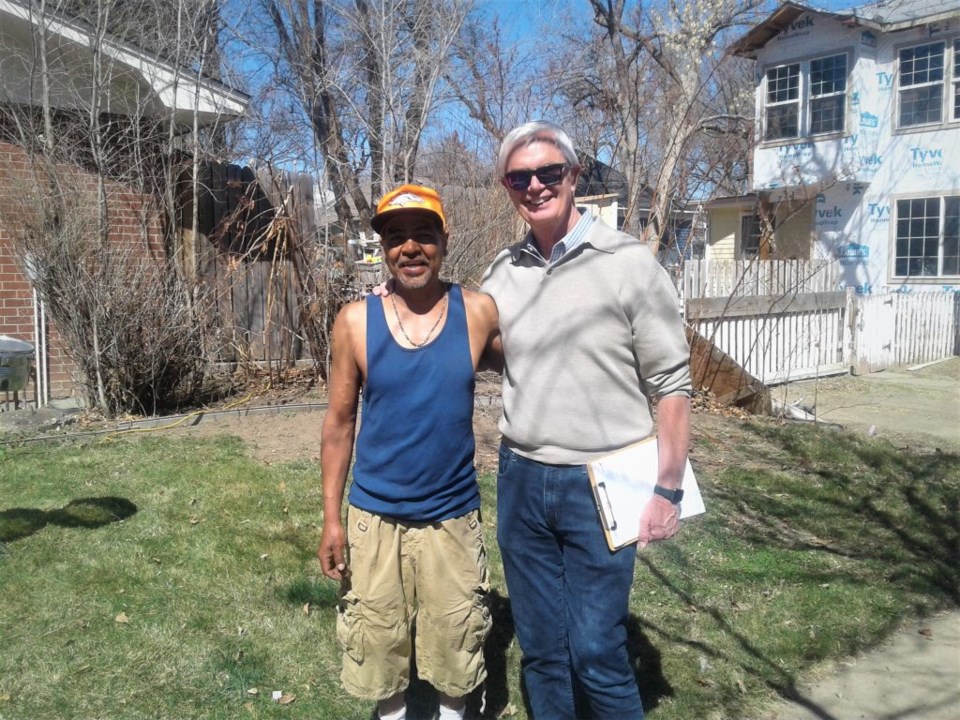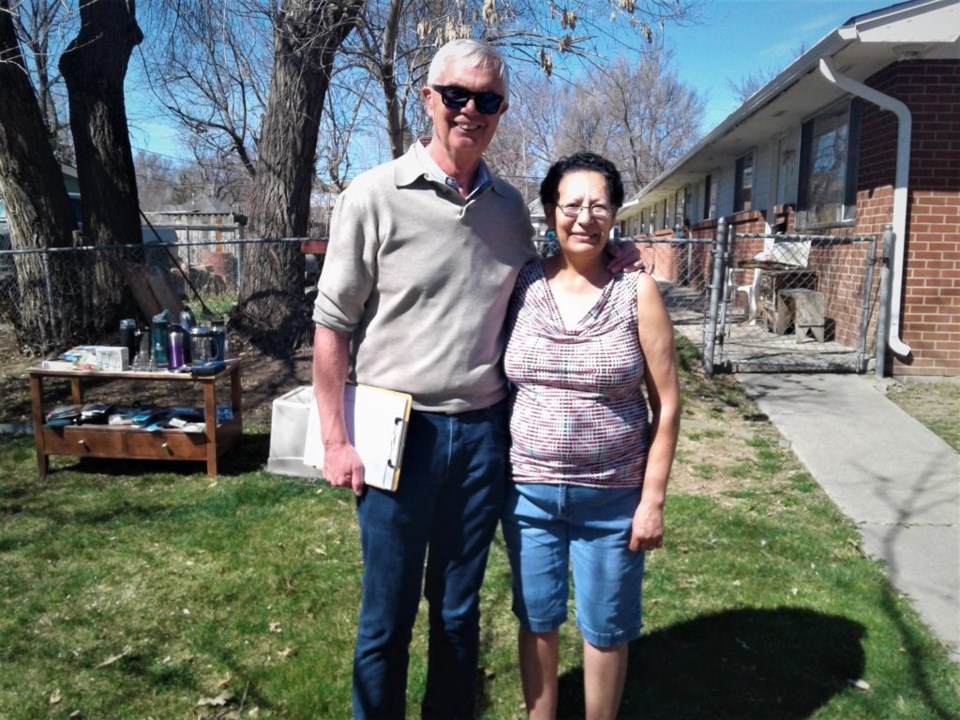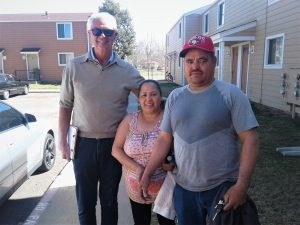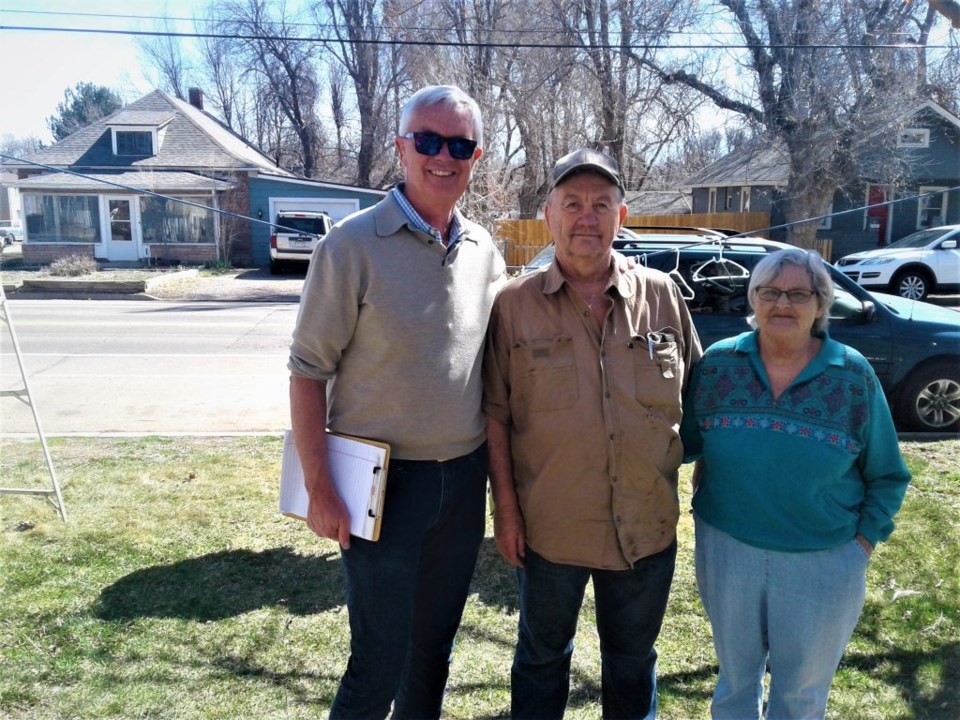This content was originally published by the Longmont Observer and is licensed under a Creative Commons license.
The Belonging Revolution is a movement that began around five years ago. Public Safety Chief Mike Butler and Dan Benavidez made their mission every Sunday morning (on fair weather days) to greet people on the streets and spread the word that they belong in Longmont.
After each walk, the duo and any guest who join them write a summary of their experience. Those experiences are below:

Martin Street neighborhood walk last Sunday 4-7-2019
Chief Mike Butler called me Friday afternoon and said, “Dan, the weather looks like
And the people there are so friendly and all who we talked to at the apartment complex love where they live and love Longmont! Several did not speak English, spoke only Spanish but all said they have
AH! A great Sunday neighborhood walk LOVE IT!!!
Thank you,
Dan Benavidez

Mike’s Perspective
Dan and I walked Stonehenge Apartments and some of the surrounding area this last Sunday.
The purpose of our walks is to encourage people we meet to feel and believe they belong to our community. That is why Dan and I call our endeavor “The Belonging Revolution.” On Sunday, we encountered several people and had in-depth conversations about the possibility of the nature of belonging to our community and what that might look like.
What we sometimes discover is that people do not see their relationship or their connectedness with their neighborhood or our community, especially folks who perceive of themselves as marginalized or forgotten or as not belonging. In our conversations, we can actually begin to see shifts in what people believe and think in terms of their relationship with our community.
Dan and I believe that the context and possibility of belonging, connectedness and even changes in language needs to come first before we begin to problem solve. We don’t believe we can problem-solve our way into fundamental change or transformation or community before people shift their own perspective about their relatedness with our community. We’ve discovered that the feeling and belief of belonging creates the context for people to want to create a different future for themselves, the people in their neighborhood and our town.
We met several people Sunday who were brave enough to share some of their story, some of their pain, and some of their hopes. One in particular, Beatrice has lived in the neighborhood for several years and knows everyone. She was having a yard sale and we chanced to meet several people as they perused Beatrice’s offerings. Dan and I started a conversation amongst all who were present and people got to meet and know some others folks. The energy level shifted as more people became involved in the conversations. Beatrice loved her neighborhood and also had a question about how people can live in one home - she pointed out a house across her street. When Dan let her know that rents are skyrocketing in our community and some families need to come together for housing, Beatrice understood.
Perhaps because it was a sunny and warm day, almost everyone we encountered possessed a cheerful disposition.
I’m attaching an article by David Brooks that I hope you read. He talks about the differences between a one-mountain person and a two-mountain person and happiness and joy.

The Moral Peril of Meritocracy
Our individualistic culture inflames the ego and numbs the spirit. Failure teaches us who we are.
By David Brooks
Mr. Brooks is an Opinion columnist. This essay is adapted from his forthcoming book, “The Second Mountain: The Quest for a Moral Life.”
Many of the people I admire lead lives that have a two-mountain shape. They got out of school, began their career, started a family and identified the mountain they thought they were meant to climb — I’m going to be an entrepreneur, a doctor, a cop. They did the things society encourages us to do, like make a mark, become successful, buy a home, raise a family, pursue happiness.
People on the first mountain spend a lot of time on reputation management. They ask: What do people think of me? Where do I rank? They’re trying to win the victories the ego enjoys.
These hustling years are also powerfully shaped by our individualistic and meritocratic culture. People operate under this assumption: I can make myself happy. If I achieve excellence, lose more weight, follow this self-improvement technique, fulfillment will follow.
But in the lives of the people I’m talking about — the ones I really admire — something happened that interrupted the linear existence they had imagined for themselves. Something happened that exposed the problem with living according to individualistic, meritocratic values.
Some of them achieved success and found it unsatisfying. They figured there must be more to life, some higher purpose. Others failed. They lost their job or endured some scandal. Suddenly they were falling, not climbing, and their whole identity was in peril. Yet another group of people got hit sideways by something that wasn’t part of the original plan. They had a cancer scare or suffered the loss of a child. These tragedies made the first-mountain victories seem, well, not so important.
Life had thrown them into the valley, as it throws most of us into the valley at one point or another. They were suffering and adrift.
Some people are broken by this kind of pain and grief. They seem to get smaller and more afraid, and never recover. They get angry, resentful and tribal.
But other people are broken open. The theologian Paul Tillich wrote that suffering upends the normal patterns of life and reminds you that you are not who you thought you were. The basement of your soul is much deeper than you knew. Some people look into the hidden depths of themselves and they realize that success won’t fill those spaces. Only a spiritual life and unconditional love from family and friends will do. They realize how lucky they are. They are down in the valley, but their health is O.K.; they’re not financially destroyed; they’re about to be dragged on an adventure that will leave them transformed.
They realize that while our educational system generally prepares us for climbing this or that mountain, your life is
So how does moral renewal happen? How do you move from a life based on bad values to a life based on better ones?
First, there has to be a period of solitude, in the wilderness, where self-reflection can occur.

“What happens when a ‘gifted child’ finds himself in a wilderness where he’s stripped away of any way of proving his worth?” Belden Lane asks in “Backpacking With the Saints.” What happens where there is no audience, nothing he can achieve? He crumbles. The ego dissolves. “Only then is he able to be loved.”
That’s the key point here. The self-centered voice of the ego has to be quieted before a person is capable of freely giving and receiving love.
Then there is contact with the heart and soul — through prayer, meditation, writing, whatever it is that puts you in contact with your deepest desires.
“In the deeps are the violence and terror of which psychology has warned us,” Annie Dillard writes in “Teaching a Stone to Talk.” “But if you ride these monsters deeper down, if you drop with them farther over the world’s rim, you find what our sciences cannot locate or name, the substrate, the ocean or matrix or ether which buoys the rest, which gives goodness its power for good, and evil its power for evil, the unified field: our complex and inexplicable caring for each other.”
In the wilderness the desire for esteem is stripped away and bigger desires are made visible: the desires of the heart (to live in loving connection with others) and the desires of the soul (the yearning to serve some transcendent ideal and to be sanctified by that service).
When people are broken open in this way, they are more sensitive to the pains and joys of the world. They realize: Oh, that first mountain wasn’t my mountain. I am ready for a larger journey.
Some people radically change their lives at this point. They quit corporate jobs and teach elementary school. They dedicate themselves to some social or political cause. I know a woman whose son committed suicide. She says that the scared, self-conscious woman she used to be died with him. She found her voice and helps families in crisis. I recently met a guy who used to be a banker. That failed to satisfy, and now he helps men coming out of prison. I once corresponded with a man from Australia who lost his wife, a tragedy that occasioned a period of reflection. He wrote, “I feel almost guilty about how significant my own growth has been as a result of my wife’s death.”
Perhaps most of the people who have emerged from a setback stay in their same jobs, with their same lives, but they are different. It’s not about self anymore; it’s about relation, it’s about the giving yourself away. Their joy is in seeing others shine.
In their book “Practical Wisdom,” Barry Schwartz and Kenneth Sharpe tell the story of a hospital janitor named Luke. In Luke’s hospital there was a young man who’d gotten into a fight and was now in a permanent coma. The young man’s father sat with him every day in silent vigil, and every day Luke cleaned the room. But one day the father was out for a smoke when Luke cleaned it.
Later that afternoon, the father found Luke and snapped at him for not cleaning the room. The first-mountain response is to see your job as cleaning rooms. Luke could have snapped back: I did clean the room. You were out smoking. The second-mountain response is to see your job as serving patients and their families. In that case you’d go back in the room and clean it again, so that the father could have the comfort of seeing you do it. And that’s what Luke did.
If the first mountain is about building up the ego and defining the self, the second is about shedding the ego and dissolving the self. If the first mountain is about acquisition, the second mountain is about contribution.
On the first mountain, personal freedom is celebrated — keeping your options open, absence of restraint. But the perfectly free life is the unattached and unremembered life. Freedom is not an ocean you want to swim in; it is a river you want to cross so that you can plant yourself on the other side.
So the person on the second mountain is making commitments. People who have made a commitment to a town, a person, an institution or a cause have cast their lot and burned the bridges behind them. They have made a promise without expecting a return. They are all in.


